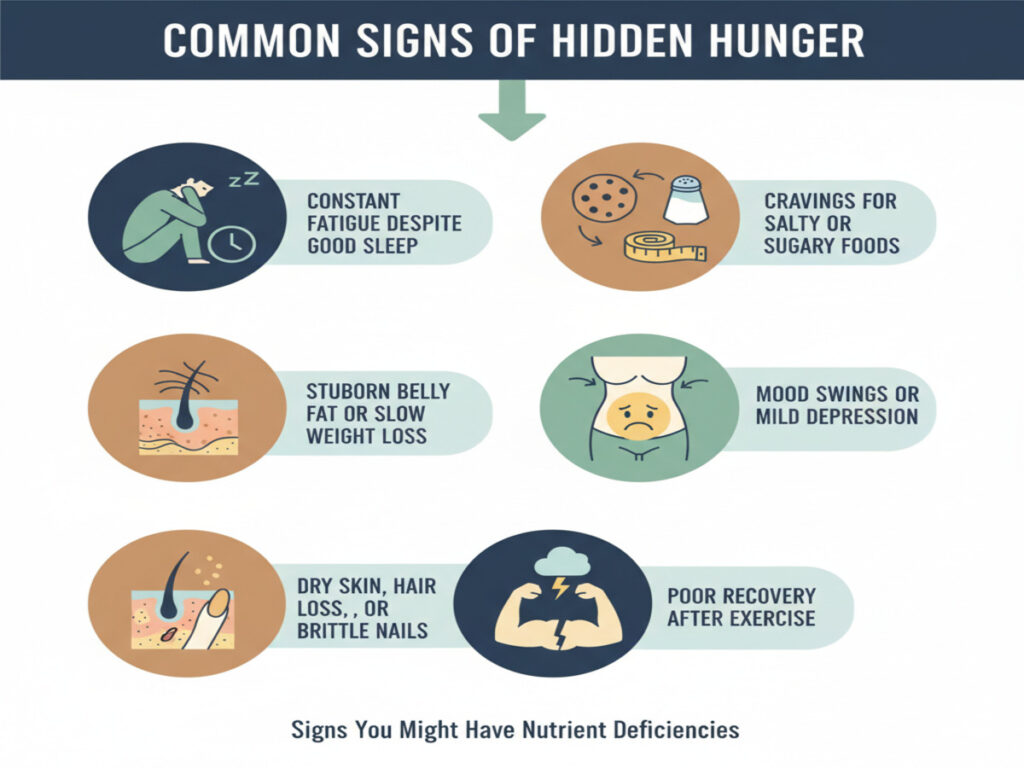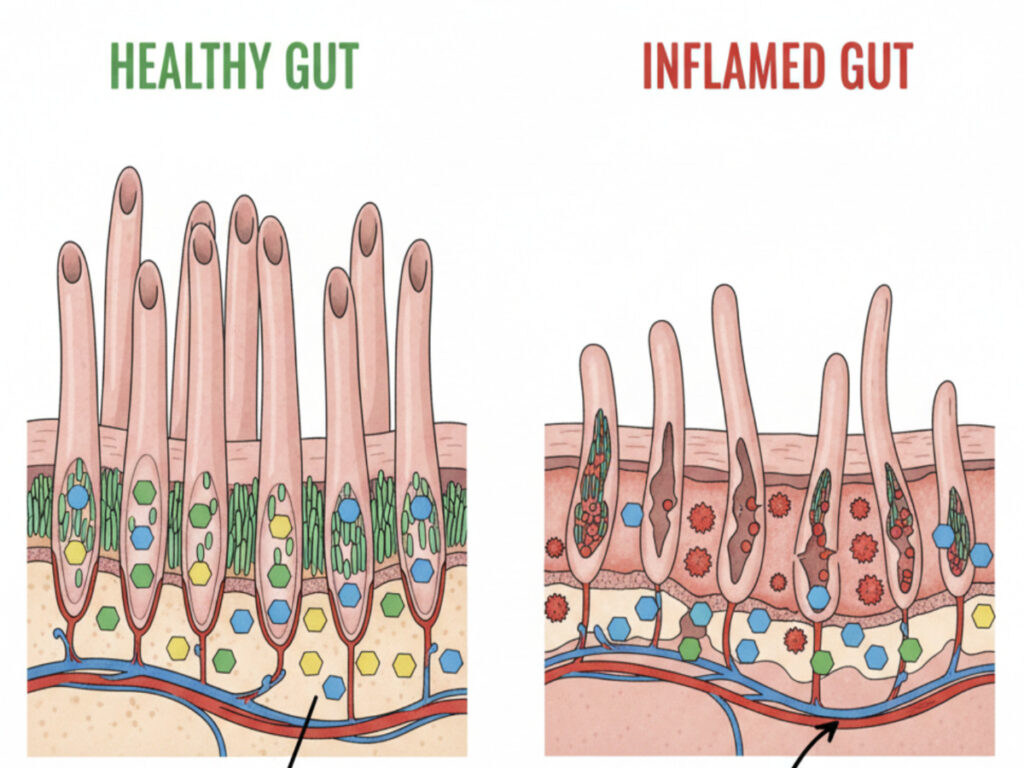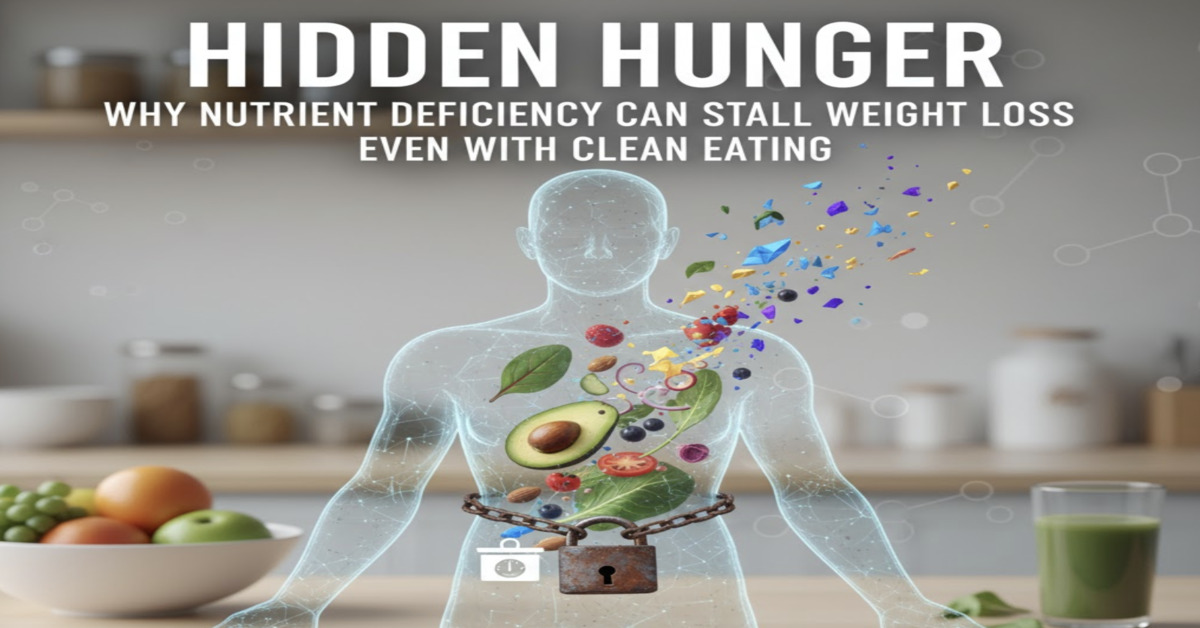Introduction: The Paradox of Clean Eating
You’re eating clean—smoothies, salads, grilled chicken, whole grains. Yet the scale won’t budge.
This frustrating plateau could stem from a lesser-known cause: Hidden Hunger — a state of micronutrient deficiency despite adequate calorie intake.
Hidden hunger silently slows metabolism, disrupts hormone function, and drains energy — even in health-conscious eaters. The issue isn’t what you’re eating, but what’s missing from your meals.

What Is Hidden Hunger?
Hidden hunger refers to a lack of essential vitamins and minerals required for optimal metabolic function, despite eating a diet that seems healthy or sufficient in calories.
According to the CDC, up to 31% of American adults have at least one micronutrient deficiency, with vitamin D, magnesium, and iron leading the list.
While hunger pangs tell you when you need calories, hidden hunger manifests as fatigue, brain fog, mood swings, and weight stagnation — subtle signs your body is starving for nutrients, not food volume.
Why Micronutrients Matter for Fat Loss
Micronutrients are the biochemical “switches” that regulate fat burning, insulin response, thyroid activity, and energy metabolism.
Key roles:
- B Vitamins (B1, B6, B12): Convert food into cellular energy.
- Magnesium & Zinc: Support insulin sensitivity and muscle function.
- Iron: Enables oxygen transport for metabolic efficiency.
- Vitamin D: Regulates hormonal balance and appetite control.
Without these, your body can’t efficiently mobilize fat — even if you’re eating less.
“Micronutrient status dictates how your metabolism performs. Calorie restriction without nutrient density can lead to a metabolic stall,”
— Dr. Emily Porter, Functional Nutrition Specialist, Harvard Health Institute.
Signs You Might Have Nutrient Deficiencies
Hidden hunger doesn’t announce itself loudly. Instead, it creeps in as slow declines in energy and performance:
- Constant fatigue despite good sleep
- Stubborn belly fat or slow weight loss
- Cravings for salty or sugary foods
- Dry skin, hair loss, or brittle nails
- Mood swings or mild depression
- Poor recovery after exercise

Common Deficiencies That Sabotage Metabolism
| Nutrient | Function in Fat Loss | Deficiency Impact |
|---|---|---|
| Magnesium | Regulates glucose, muscle function | Insulin resistance, fatigue |
| Zinc | Supports thyroid and hormone production | Slow metabolism, poor recovery |
| Iron | Oxygen transport, energy metabolism | Tiredness, poor endurance |
| Vitamin D | Fat metabolism, immune function | Weight gain, mood changes |
| B12 & Folate | Energy and DNA synthesis | Brain fog, low energy |
| Iodine | Thyroid hormone synthesis | Sluggish metabolism |
How Hidden Hunger Develops Even with Healthy Diets
You might be eating “right,” but here’s where nutrient gaps sneak in:
- Monotonous diets: Relying on the same foods limits nutrient diversity.
- Modern farming: Soil depletion reduces mineral content in produce.
- Calorie restriction: Dieting often cuts micronutrient intake.
- Processed “health foods”: Packaged items labeled “low-fat” or “diet” may lack essential minerals.
- Gut absorption issues: Leaky gut, stress, or low stomach acid hinder nutrient uptake.
Statistic: A 2024 study by Frontiers in Nutrition found that 70% of “clean eaters” were still low in magnesium, zinc, or iron due to food monotony and gut malabsorption.
The Role of Gut Health in Nutrient Absorption
Even the most balanced meal is useless if your gut can’t absorb nutrients effectively.
- Low stomach acid impairs mineral absorption.
- Inflamed intestines block vitamin uptake.
- Poor gut microbiota reduces B-vitamin synthesis.
Fix: Support gut health through fermented foods (kefir, sauerkraut), prebiotics (onions, garlic), and periodic probiotic cycles.

Actionable Fix: Micronutrient Rebalancing Blueprint
Step 1: Audit Your Diet
Use a tracking app (like Cronometer) to assess daily intake of key nutrients.
Step 2: Diversify Food Colors
Each color provides different phytonutrients — aim for “rainbow meals.”
Step 3: Add Mineral Boosters
- Add sea salt (for sodium and trace minerals)
- Include nuts, seeds, and leafy greens daily
Step 4: Check Blood Levels
Ask your doctor to test: Vitamin D, B12, Iron/Ferritin, and Magnesium RBC.
Step 5: Supplement Strategically
Use bioavailable forms (e.g., magnesium glycinate, methylated B12) under professional guidance.
Nutrient Density Table: Key Vitamins, Sources & Fat-Loss Impact
| Nutrient | Top Food Sources | Fat-Loss Impact |
|---|---|---|
| Magnesium | Almonds, spinach, dark chocolate | Improves insulin response |
| Vitamin D | Salmon, egg yolks, sunlight | Enhances fat oxidation |
| Zinc | Pumpkin seeds, beef, lentils | Boosts thyroid output |
| B Vitamins | Eggs, liver, legumes | Improves energy production |
| Iron | Red meat, lentils, spinach | Increases endurance |
| Iodine | Seaweed, iodized salt | Maintains metabolic rate |
Expert Insights on Nutrient Optimization
“Weight-loss stalls are rarely about calories—they’re about missing cofactors that run your metabolism,”
— Dr. Brian Kelley, Integrative Metabolism Researcher, Stanford University.
“You can’t out-diet a micronutrient deficiency. The most effective fat loss strategy is nutrient sufficiency first, caloric deficit second,”
— Dr. Amy Rodriguez, Registered Dietitian, Mayo Clinic.
Hidden Hunger vs. Calorie Restriction: The Real Difference
| Hidden Hunger | Calorie Restriction |
|---|---|
| Nutrient deficiency | Energy deficit |
| Slows metabolism | Burns stored fat |
| Causes cravings | May reduce appetite |
| Leads to fatigue | Improves energy when balanced |
| Long-term harm | Can be sustainable if nutrient-rich |
Practical Tips for Correcting Hidden Hunger
✅ Include at least 30 different whole foods weekly
✅ Rotate protein and vegetable sources every 3 days
✅ Add mineral-rich broths or trace mineral drops
✅ Use cast-iron cookware for natural iron boost
✅ Limit ultra-processed “healthy” snacks
✅ Prioritize sleep to improve nutrient absorption

FAQs
Q1: Can I be deficient even if I eat enough calories?
A: Yes, hidden hunger occurs when nutrient density is low despite adequate calories.
Q2: Which deficiencies most affect fat loss?
A: Vitamin D, magnesium, zinc, and iron play key roles in metabolism.
Q3: Are multivitamins enough?
A: Not always. Whole foods provide synergistic compounds supplements can’t replicate.
Q4: How long does it take to fix deficiencies?
A: Typically 4–12 weeks, depending on diet quality and gut health.
Authoritative Resources
- NIH – Micronutrients & Human Health
- Harvard T.H. Chan School of Public Health – Nutrition Source
- Mayo Clinic – Vitamin Deficiency and Metabolism
Other Interesting Articles
- Electrolyte Burnout: Why Over-Hydration Can Hurt Performance
- Modern Sedentary Syndrome: The New Metabolic Threat in Remote Workers
Conclusion & Call-to-Action
Hidden hunger is the silent roadblock in modern fat-loss journeys. Without nutrient sufficiency, even perfect calorie tracking falls short.
By rebalancing your micronutrients, you can:
- Reignite metabolism
- Eliminate persistent cravings
- Boost energy and mood
- Accelerate fat loss naturally
Take action today: Reassess your meals for diversity and mineral content. Your body doesn’t need more restriction — it needs more nourishment.

